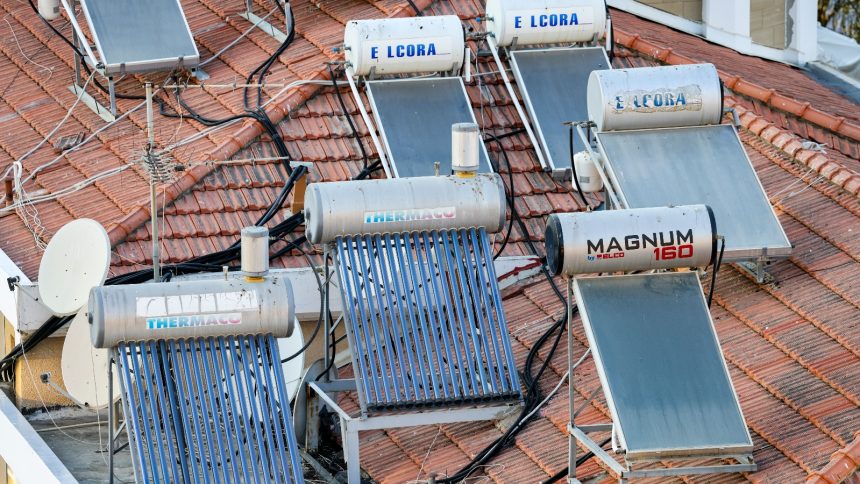This story was originally published by The Guardian and is reproduced here as part of the Climate Desk collaboration. The Thriamvos company truck pulls up at noon outside the four-storey building in the heart of Nicosia. It’s the third rooftop installation of a solar-powered water heating system that Petros Mihali and his assistant, Soteris, have made in the Cypriot capital since their working day began at 7am. The process is perfectly choreographed and almost always the same: in the searing midday sun, the crane bolted on to the truck hoists the boiler up first, then the black-paned solar panels, then the galvanized steel mount on which the entire system will stand. Within two hours of the thermal technology being set up, the household, say the Thriamvos company employees, will have “gone solar.”
“We do around four installations a day across Cyprus,” says Mihali. “And each takes little more than two hours at most because, like the system itself, it’s all so easy.”
Cyprus has outstripped all other EU member states in embracing hot-water solar systems, with an estimated 93.5 percent of households exploiting the alternative energy form for domestic needs. EU figures show the eastern Mediterranean island exceeding renewable energy targets set in the heating and cooling of buildings thanks to the widespread use of the solar thermal technology. Read Next How Germany outfitted half a million balconies with solar panels
“There are many areas where Cyprus has not achieved greenhouse gas emission goals,” says Charalampos Theopemptou, the island’s first environment commissioner. “But in terms of renewable energy resources being used for the sustainable heating and cooling of buildings, we’ve met the target easily, precisely because of such extensive utilization of solar water heaters for so many years.”
Theopemptou, a Green Party MP who heads the Cypriot parliament’s environment committee, can still vividly recall seeing the first solar water heating system installed on the rooftop of his wife’s family home almost 60 years ago. “It was in the late 1960s that the water heaters were introduced to Cyprus, and I can still remember the very first system here because it happened to be erected on the roof of that building in Nicosia,” he recalls. “The Israelis were the ones to introduce the technology to us and it quickly took off because it’s so simple. All you need are solar panels, a tank and copper pipes. Ever since, it’s been a wonderful solution to the hot water needs of households here.”
The solar thermal systems not only collected solar energy as heat – usually generated through electricity and the burning of fossil fuels – they were extremely cost-effective and had helped spawn an entire industry, he explains. “It’s been great for low-income families and then there’s the jobs: so many have been generated,” the MP says. “There are the local manufacturers who produce the parts and then all the people who are trained to install them. It’s big business.”
In his role as environment commissioner, Theopemptou pushed hard to make the solar systems obligatory on all newly constructed residential and commercial buildings – a move instituted by Israel back in the 1970s. Read Next Politicians don’t get how popular climate action is. That’s a problem.
“In my role as commissioner it was a priority,” he says. “Architects now have to make sure that rooftops not only have enough space for the installations but that they can also carry the weight.” The popularity of the water heaters is such that a union of local solar thermal industrialists was established in 1977. Since then, more than 962,564 square cubic meters of “solar [panel] collectors” have been installed, the union says. Increasingly, the country’s vibrant tourist industry has also resorted to the green solution with solar-powered hot water systems deployed in, they say, close to 100 percent of hotels.
Electricity was slow to reach households across Cyprus. It wasn’t until 1903 that electricity was introduced by the British colonial government to the island. In 1952, eight years before the country won independence, its Electricity Authority was eventually established. In fact, in remote areas the solar systems were often put on to village rooftops before the arrival of the power grid. With most of the network still running on mazut fuel oil or diesel, Cyprus is among the cohort of EU countries forced to buy emission quotas from other member states to meet legal objectives – an obligation that accounts for up to a third of the monthly cost of electricity bills, much to the ire of Cypriot households. That has also played a role in homeowners installing solar water heating systems.
For Demetra Asprou, a retired engineer, it’s obvious that a region blessed with more than 300 days of sunshine a year should embrace solar energy. “It reduces electricity costs, increases the efficiency with which hot water is provided and is kind to the environment,” she says. “Why would anyone use other, more traditional means to heat up water when only a few hours of sunlight, between 11am and 2pm, is enough for a 200-liter [44-gallon] tank to be filled with warm water that will last 48 hours? On days when there is no sunlight, which is rare, you always have electricity as a backup if necessary.” Read Next What climate policies work best? A new study has answers.
Now in her 70s, Asprou, who lives in a Finnish-style log house in the foothills of the Troodos Mountains, a 30-minute drive from Nicosia, was a convert to the thermal system nearly 40 years ago. “Installation costs may be three times higher today, but there are EU-funded grants that the government hands out and within a year it’s all paid off,” she says. “After that, you basically have free hot water and see your electricity bills greatly reduced. In a country like Cyprus, it’s a no-brainer.”
Theopemptou accepts that the solar systems have one drawback: they’re not good for the skyline. “There’s no way about it, they’re ugly on a rooftop,” he laments. “If I have one regret its that we didn’t manage to introduce regulations to improve the aesthetics of the installations. That said, I still believe they should be mandated on all buildings across the region, given the great number of days we have sunshine in the Mediterranean.”
!function(f,b,e,v,n,t,s) {if(f.fbq)return;n=f.fbq=function(){n.callMethod? n.callMethod.apply(n,arguments):n.queue.push(arguments)}; if(!f._fbq)f._fbq=n;n.push=n;n.loaded=!0;n.version=’2.0′; n.queue=[];t=b.createElement(e);t.async=!0; t.src=v;s=b.getElementsByTagName(e)[0]; s.parentNode.insertBefore(t,s)}(window, document,’script’, ‘https://connect.facebook.net/en_US/fbevents.js’); fbq(‘init’, ‘542017519474115’); fbq(‘track’, ‘PageView’);






